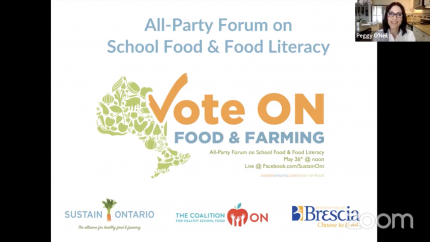School food and food literacy… an idea whose time has come
Posted: May 30, 2022
Categories: Edible Education Network / Good Food Ideas for Kids / GoodFoodBites / School Food News / Schools
 Victor Hugo has reminded us that “Nothing is stronger than an idea whose time has come”, and it’s evident that the time has come for school food and food literacy in Ontario.
Victor Hugo has reminded us that “Nothing is stronger than an idea whose time has come”, and it’s evident that the time has come for school food and food literacy in Ontario.
In October 2020, MPP Daryl Kramp introduced a private member’s bill, Food Literacy for Students Act, that would make hands-on food literacy mandatory for students in Grade 1 to 12. Its potential was as exciting as it was wide-reaching.
Simply put, the impacts of good food education are monumental. School food has the ability to nourish students’ health, their education, surrounding communities, the economy, and the environment.
Advancing healthy school food programs and food literacy is work that must be done across party lines. It’s a non-partisan issue.
That is why we are pleased to hear support for food literacy from all of Ontario’s major political parties. And it’s why—with an election just days away—Sustain Ontario, the Coalition for Healthy School Food, and Brescia University College hosted a virtual All-Party Forum on School Food and Food Literacy on May 26th.
If you missed the livestream, you can watch the event recording on Facebook here and YouTube here.
Prior to the event, candidates were given these four questions to answer:
If elected, what will you do to…
- Advance food literacy as a mandatory part of the school curriculum for grades 1-12?
- Strengthen the conditions for experiential food literacy education in Ontario schools?
- Address Ontario’s annual investment in the Student Nutrition Program to accommodate rising food costs coupled with greater demand?
- Work with the federal government on a national, universal healthy school food program?
In the recording, you will hear from the following candidates (listed in order of appearance) representing their parties:
- Matt Richter, Green Party of Ontario, Parry Sound-Muskoka (begins at 06:45), stressed the need for holistic support and sustainable funding for food literacy education, as well as relationship building. Specifically, the Greens have said they would support increased funding for the Ontario Student Nutrition Program (OSNP), as well as work with the federal government on a national school food program.
- Amanda Pulker-Mok, Ontario Liberal Party, Lanark-Frontenac-Kingston (begins at 20:15), emphasized the need for partnership building, including bringing back the Education Partnership Table. Specifically, the Liberals have said they would expand the OSNP, and support a universal breakfast program.
- Terence Kernaghan, Ontario New Democratic Party, London North Centre (begins at 31:45), also highlighted the importance of food literacy and experiential learning, as well as the need for infrastructure support. Specifically, the NDPs have said they would support the OSNP, and work with the federal government on a national school food program.
- As we were unable to schedule a candidate with the Progressive Conservative Party of Ontario, folks are encouraged to reach out to their local PC candidate with questions. Once again, we’d like to thank PC MPP Darryl Kramp for introducing Bill 216, Food Literacy for Students Act, 2020.
We encourage you to check out the full recording to hear the candidates thoughts in further detail.
For more information on these issues and why they matter, please visit our 2022 #VoteONFood campaign. And read more about food literacy in Ontario schools in this new Toronto Star op-ed by Peggy O’Neil and Alicia Martin (reprinted in French in News 24).
We would like to thank the candidates for taking the time to share their thoughts and platforms with us, and to all who engaged with the livestream!
Election Day is June 2, 2022. The time is now for school food and food literacy in Ontario — don’t you agree?
